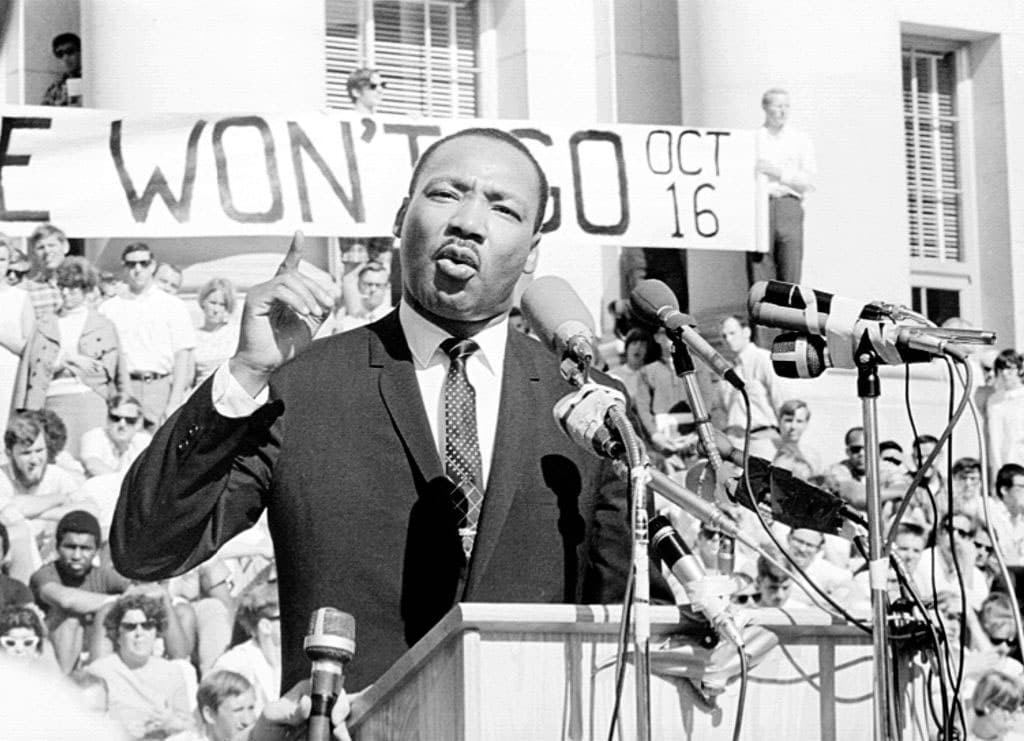 Civil rights leader Reverend Martin Luther King, Jr. delivers a speech to a crowd of approximately 7,000 people on May 17, 1967 at UC Berkeley’s Sproul Plaza in Berkeley, California. (Photo by Michael Ochs Archives/Getty Images)
Civil rights leader Reverend Martin Luther King, Jr. delivers a speech to a crowd of approximately 7,000 people on May 17, 1967 at UC Berkeley’s Sproul Plaza in Berkeley, California. (Photo by Michael Ochs Archives/Getty Images) By the time he was assassinated in Memphis on April 4, 1968, Martin Luther King Jr. was in the second chapter of his iconic activist life. His famous “I Have a Dream” speech, delivered on the steps of the Lincoln Memorial in 1963, punctuated his first chapter, and ushered in the Civil Rights Act of 1964. A striking legacy of that speech was his dream that his “four little children … will not be judged by the color of their skin but by the content of their character.”
Five years later, as he was walked out of his room at the Lorraine Motel to meet an assassin’s bullet, his mind was on other matters. His focus had shifted from civil rights to building an interracial coalition to end the war in Vietnam and force major economic reforms. He had plans for a massive Poor People’s Campaign rally in Washington. He realized more than ever that civil rights without economic rights was fool’s gold.
It’s worth reflecting on this dual legacy as we honor King on his annual day of remembrance.
Because the man did so much and said so much, there’s a tendency to cherry pick sections of his legacy to support one’s preferred narrative. I’m guilty of that myself, having a clear bias in favor of judging people by the content of their character.
I often wonder, in fact, how King would have reacted to the obsession with race that dominates much of today’s social activism. I wonder if he would sympathize with Black thinkers like John McWhorter, the Columbia professor and linguist whose recent book, “Woke Racism: How a New Religion Has Betrayed Black America,” has become a bestseller.
I often wonder how King would have reacted to the obsession with race that dominates much of today’s social activism.
I can’t speak for King, but I suspect he’d look at any activist movement trying to fight racism and help the Black community through this lens: Is it helping Blacks? It is improving their education? Is it addressing poverty and offering more economic opportunities?
At the end of a life that was cut short way too soon, King was focused on building interracial coalitions. His Poor People’s rally was for all the poor, regardless of race, gender or ethnicity. Perhaps by then, he understood that some Black problems were also non-Black problems; that there were non-Black poor as well as Black poor; that coming together under a common interracial cause of improving economic opportunities was indeed a sign of racial progress.
So, which MLK legacy should we honor—the “I Have a Dream” legacy that focused squarely on helping Blacks, or the interracial legacy that focused on common ills between Blacks and non-Blacks?
We should honor both, because we need both.
If the dream of his first chapter was that his children be judged by the content of their character, the interracial efforts of his second chapter was his way of helping that dream come true. It was his promised land for all of America.
Happy MLK Day.






















 More news and opinions than at a Shabbat dinner, right in your inbox.
More news and opinions than at a Shabbat dinner, right in your inbox.